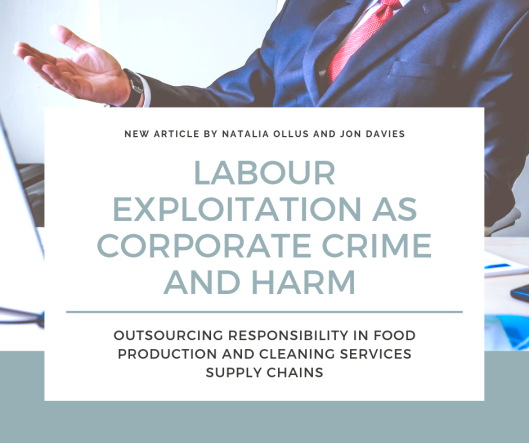Labour exploitation as corporate crime and harm: outsourcing responsibility in food production and cleaning services supply chains

HEUNI’s director, Dr Natalia Ollus co-authored an article together with Dr Jon Davies (currently at the University of Tel Aviv) arguing that labour exploitation – and ultimately labour trafficking – can be framed as a form of corporate crime. The article was published in Crime, Law and Social Change. The article brings together empirical research in Finland and the UK. In the article, Natalia builds upon previous research carried out at HEUNI (see the FLEX and ADSTRINGO projects) as well as her PhD, which is among the first pieces of research presenting this argument.
The article shows that companies and corporations have a dual role: they can on the one hand enable or facilitate exploitation, but they can also act to prevent it. As argued in previous HEUNI research, labour exploitation is not only driven by individual criminals, rogue employers organised crime groups. Instead, the article argues that exploitation is in many ways rooted in businesses and their supply chains, but also in the markets themselves and in the broader political-economic context. By examining the risks of labour exploitation within industries rather than just among individual actors, it is possible to explore the ‘grey areas’ between legitimate and illegitimate (business) practices, legal and illegal markets, as well as the wider societal context. The corporate crime approach provides a useful lens through by moving attention from intentional, interpersonal, and direct forms of harm towards unintentional, structural, and indirect harm.
Using empirical data from the UK food production industry and the Finnish cleaning industry, the article shows that the price pressures in both sectors, narrow profit margins, the need for timely orders/service, and fluctuating demand, has resulted in work becoming informalized and intensified in order to meet contractual obligations. In both the UK food production and the Finnish cleaning industry subcontracting is frequently associated with flexible employment contracts, including ‘zero hours contracts’ that do not guarantee a set number of weekly hours. Both the UK food production industry and the Finnish cleaning sector are characterised by tight profit margins and fluctuations in demand, which translate into a need for labour flexibility. Both sectors are characterised by an increased use of subcontracting and outsourcing. The use of suppliers and subcontractors may result in an “outsourcing of responsibility", in particular when there is limited oversight and liability further down the supply chain. Subcontracting and outsourcing therefore contribute to the risk of labour exploitation in the supply chain.
The article also argues that businesses cannot and should not be responsible for regulating themselves. Existing frameworks are insufficient to deal with exploitation, in particular when it takes place within legitimate supply chains. While the UK Modern Slavery Act is an important step in addressing severe exploitation, it is less effective in tackling ‘less severe’ embedded forms of exploitation. Similarly, in Finland, the oversight of transgressions of labour conditions remains insufficient. By framing exploitation as a form of corporate crime, the article argues that it is possible to highlight that certain business practices, such as outsourcing and subcontracting, while being legal, create situations of harm for and exploitation of workers in these sectors.